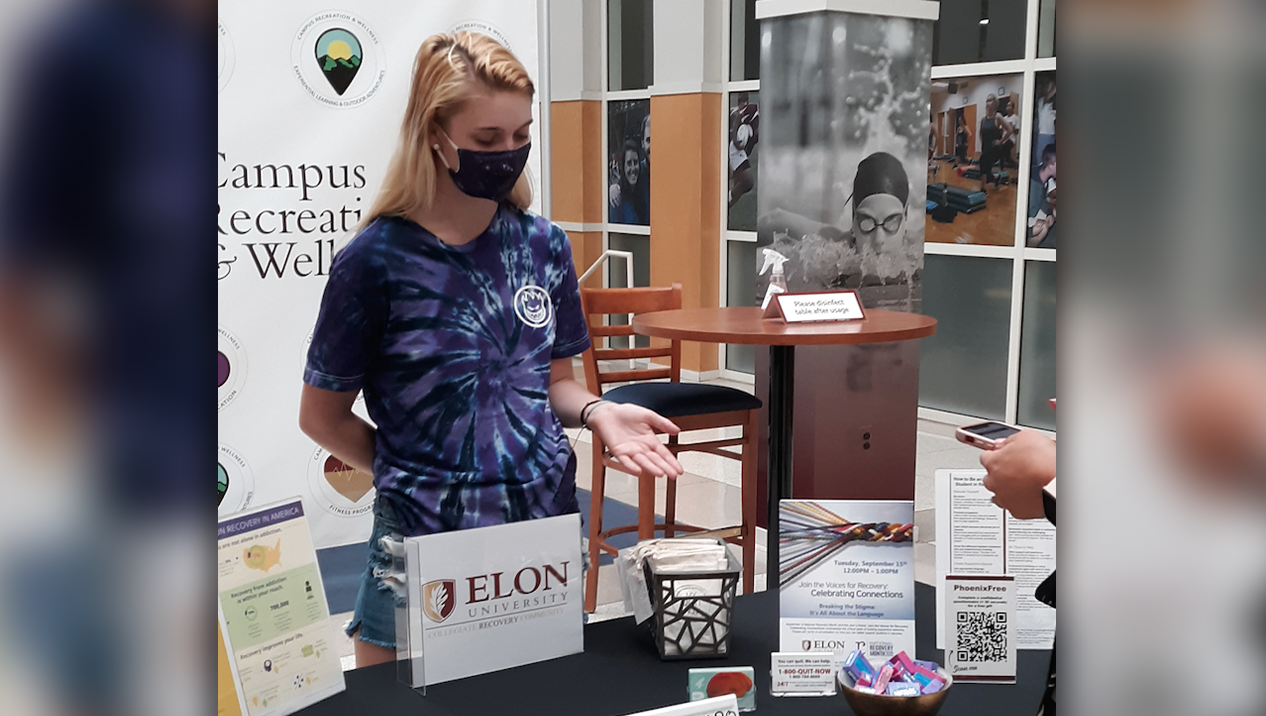As a part of National Recovery Month, Campus Recreation and Wellness is highlighting the Collegiate Recovery Community, a program for Elon students seeking recovery support and opportunities to engage in a substance-free college experience.
At a time when one in seven full-time college students nationwide meets the criteria for substance use disorder and roughly 20 percent of college students meet the criteria for alcohol use disorder, Campus Recreation and Wellness is cultivating a supportive community where students can achieve academic success and engage in a meaningful, substance-free college experience.

A growing number of colleges and universities are expanding the spectrum of student support services to include on-campus collegiate recovery programs. Likewise, Elon continues to promote student wellness and well-being as top priorities through a collegiate recovery program of its own. In 2019, Campus Recreation and Wellness introduced the Collegiate Recovery Community (CRC), a peer-led program meant to help students maintain a sober and healthy lifestyle in order to fully engage in their academic, social and personal pursuits.
“Chances are you know someone who is either in recovery or has been impacted by substance misuse,” said Callie Kelly, program coordinator for CRC and coordinator for student wellness. “So I think this is a critical program, especially for students, as they make that transition from high school to college, which can create a significant amount of stress, and that can contribute to an increase in alcohol or substance use.”
The university launched a four-year partnership with the JED Foundation in 2018 to assess student support services for mental health and substance use. Final recommendations from the campus assessment included establishment of a collegiate recovery community and/or support programs on campus for students.
The program is funded by the Thomas D. Shaffner Charitable Foundation for the specific purpose of addressing substance use prevention and supporting recovery from alcohol and substance use disorders. In addition, Elon’s Council on Alcohol and Other Drugs champions this cause and supports recovery initiatives to help shift the campus mindset related to substance use.
The CRC is currently in its first phase, which focuses on creating a “recovery-minded campus” at Elon by raising awareness of recovery, building recovery allies, and offering ways to support recovering students in and out of the classroom.
The CRC’s programming includes pop-up information tables across campus to offer available resources to students in recovery or to people who know someone in recovery. The organization also hosts ally training sessions to help others learn how to best support students throughout the recovery process. The CRC will host another ally training on Tuesday, Sept. 15 as a part of National Recovery Month. Topics include valuable information needed to support someone through their recovery, including using inclusive language to best communicate with someone in recovery – using the phrase “substance use” as opposed to “substance abuse,” for instance.
“It’s really about us normalizing recovery as much as possible and providing a campus where students can feel supported in making the decision to be substance-free,” Kelly said.
The College Recovery Community is currently led by Kelly, as well as Program Director and Associate Director for Student Wellness Charlotte Williams and Faculty Fellow for Substance Education and Professor of Strategic Communications Julie Lellis. The goal is for the program to be completely student-driven. The initiative already has buy-in from a few students, including Eleanor Irion ’22.
“I am pumped about this opportunity because addiction can be a very lonely disease, especially on a college campus,” Irion said. “This program will give me a chance to find a loving and supportive community that will help me achieve the sober lifestyle that I need in order to succeed on Elon’s campus. I am also excited for the chance to educate my peers about recovery so together we can help eliminate the stigma behind it. Elon needs this because I am certain that there are other students like me who are battling addiction and they shouldn’t have to take on this fight alone.”
The CRC is also an institutional member of the Association of Recovery in Higher Education (ARHE), which serves as the lead authority on research and best practices for collegiate recovery. As Elon’s program continues to broaden its impact on campus, the organization will offer students peer connections and social networking, substance-free social events and programs, student-led support groups and meetings. These opportunities will give students safe spaces to go through the process of improving their health and wellness, living self-directed lives and striving to reach their full potential.
Elon’s investment in a CRC is not only advancing recovery by transforming lives, but also enhancing the academic success of students. “It’s important that students in recovery know they are not alone,” Kelly said. “This program is designed for that particular student in mind, to provide them with the support they need.”
Faculty interested in learning how to best support students in recovery or opportunities related to substance education should contact Julie Lellis. Learn more about the Elon Collegiate Recovery Community here or email phoenixfree@elon.edu.



